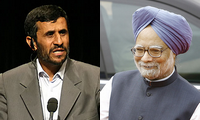Ending a months-long dispute over oil payments, Iran has now resumed oil shipments to India, with Turkey stepping in as a key facilitator to resolve the impasse. Turkey's Halkbank is currently routing Indian oil payments to Iran that had been blocked by U.S. sanctions; according to reports, more than 80 percent of the $5 billion in accumulated arrears have been cleared. The tripartite arrangement, which comes amid regional tensions over Syria's future, indicates that India and its overall energy interests are emerging as a key variable in the strategic calculus of Middle Eastern capitals.
Previously characterized mainly by drift, the Indo-Iranian relationship had developed serious functional problems in the past 12 months. These were caused chiefly by India's refusal to settle its oil payments to Iran via the well-established Asian Clearing Union mechanism, due to concerns about violating U.S. sanctions targeting Iran's nuclear program. The result was a minor crisis that proved difficult to resolve. Initial attempts to channel some payments through the Frankfurt-based Europaeisch-Iranische Handelsbank had to be abandoned on account of U.S pressure. It was clear that a new and more stable arrangement was needed, since the India-Iran energy relationship is of vital importance to both sides. Iran is India's second-largest source of hydrocarbon imports, supplying some 400,000 barrels a day, while India is Iran's second-biggest customer for energy exports after China.
Turkey stepped up to fill this need for payment stability, while at the same time reaffirming its commitment to improved relations with Iran. Although Ankara and Tehran continue to diverge over the way forward in Syria, their energy relationship is more robust than ever before. Iran's gas exports to Turkey have more than doubled in the past few years, helping Turkey position itself as a transit point for gas to Europe. As the Turkish Parliament's Energy Committee chairman, Mahmut Mucahit Findikli, put it, "There is no reason to dismiss Iran's importance in our energy policy. We need this door -- not only for Turkey's energy security, but for Europe's, as well." Turkey and Iran also moved quickly to repair the Tabriz-Ankara pipeline after it was blown up last month by fighters from the PKK, a Kurdish separatist group. With Kurdish insurgencies targeting both Turkey and Iran, the response to the attack underlines the two countries' desire to ensure the stability of cross-border trade transiting the Kurdish region that straddles Turkey, Iran, Syria and Iraq. In fact, with the Syrian situation still in flux, Turkey's role in settling the Indo-Iranian payments crisis can be seen as both a confidence-building measure for Tehran and an effort to secure leverage in the regional energy trade.

